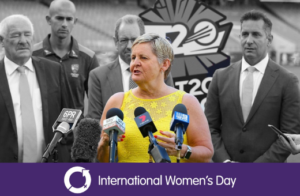Christina Matthews is one of the most well-respected voices in WA sport.
Recently announced as the inaugural recipient of the Department of Local Government Sport and Cultural Industries Sports Administrator of the Year at the SportWest Awards, when she talks people listen.
Since taking on the role of WA Cricket in 2011, she and her team have been working to break the bias in the game along with winning cricket titles, moving major cricket matches to Optus Stadium and redeveloping the WACA Ground for the future.
“Many years ago if you hadn’t played cricket, working in a cricket association was just considered not something that you can do,” Matthews said.
“By changing the way we employ, why we employ people and understanding that you don’t need to play a cover drive to work in the game, you are automatically breaking that bias.”
Matthews and WA Cricket have also been central to changing cricket terminology. Moving away from gender specific terms like batsman and embracing the term batter.
“Language use is very important. So it is very easy for people, male or female ,to go that is just political correctness it doesn’t make any difference but when you work with kids they take things literally.
“They don’t know that batsman is supposed to be a generic term. Well it didn’t start as a generic term because it was about men who batted.
“You kind of have to understand that people take these things literally and so you have to change language to suit what you actually meant.”
Matthews also believes it is important to engage men in order to help break the bias.
“There are very few women who don’t understand what the problems are but very few men who do and see that there needs to be affirmative action taken,” Matthews said.
“We need to be having these conversations regularly with men and understanding they do control how these things happen. It is not an accident the way the balance has been skewed for a long time and to understand that it is also no one’s fault, it is just how it has been but we have an opportunity to make it better.”
The former Australian wicketkeeper, who played 20 Tests for Australia during an 11-year career, looked to two other women for inspiration when she moved into sports administration.
Ann Mitchell a former cricketer and Australian cricket administration and Australian basketball administrator and former player and coach Lorraine Landon.
“I kind of learnt from them that there are women who do these things and that you can give back and you can compete and administer so I learnt a lot from them,” Matthews said.
Back in her playing days, women’s cricket was not consistently broadcast.
Matthews believed year-round coverage of women’s sports across the two major sporting codes, AFL and cricket, meant that having women’s sport in television was now universally accepted.
“There is an accepted time of the year that it is on, people expect it to come on which is what is different to when I played, no one knew when the state teams were playing or the Australian team,” Matthews said.
“The persistent presentation of elite cricket for women then has created a demand for it at grass roots and I think the combination of cricket and AFL doing it almost simultaneously has really been the game changer.
“I don’t think one sport doing it on their own would have worked but having the two traditionally strongest sports for men both developing women’s leagues within 12 months of each other, so all year round you are getting women’s sport coverage has normalised women’s sport.
“Don’t forget that when I played, there was a lot of talk about we weren’t capable of playing as opposed to whether we were allowed to or not.
“Today’s players have proved that with the same level of training and opportunity the games aren’t that much different. And in fact the women’s game is in fact more attractive to those who are traditionalists because there is much more of a mix in limited overs cricket of running between the wickets and boundary hitting whereas boundary hitting is very dominant in the men’s game.
“There’s much more openness to women’s sport and we’ve got to keep doing that.”
While the explosion of AFLW and cricket in particular has helped to put women’s sport into the lounge rooms across the country, Matthew said it was important for the sport industry to be open and willing to change itself.
“AFLW is a really good example. The things that they are being made to do to have a competition through February and March, in the hottest part of the year, they would never ask men to do,” Matthews said.
“They are part-time athletes who are having to give up work and the AFL is doing it because they want to own the whole year for football but they are damaging people in doing it.
“They’ve got to work out how they can present a women’s league that is not costly to the women themselves.”
Matthews also believes groups such as the Women of Sport are important as it provides opportunities for the next generation of sports administrators to engage with role models in the industry.
“Seeing senior females around is very important for young women coming into the game and there are more and more of them who are seeing sport as an option for them, either playing or in administration or in journalism or communications,” she said.
“You need people who are available to them to consult, to answer questions and so forth and to raise awareness in the broader scheme of things that women can be CEOs of sports associations and continuing to grow that field.”
And Matthews advice for young women making their way in sports administration is that persistence and perseverance are very important.
“Not everything goes smoothly. Sport is like every other job, there are times when it is going to drive you mad and you are going to feel frustrated and you feel like you are not getting anywhere but sport and recreation is such a wonderful thing for our community and our country that it is worth persevering through and you never know what is going to come of what you are doing.”
By. Steve Glover
First Published: March 8, 2022






